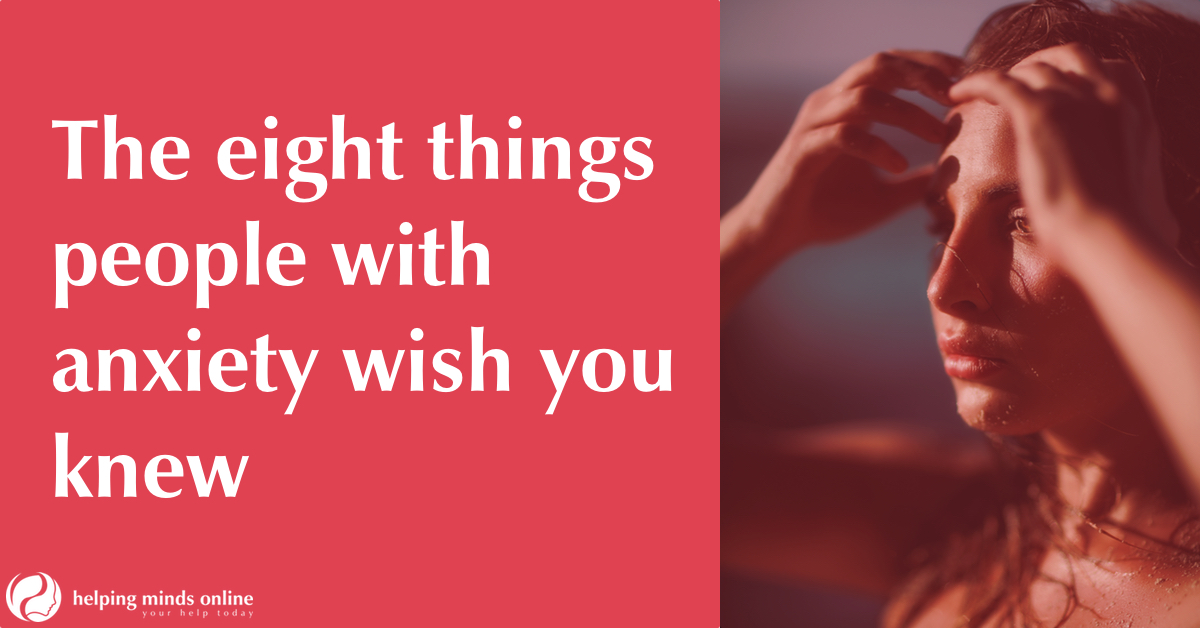
There are key things people with anxiety wish you knew and understood. Anxiety is characterised by chronic worry and catastrophic thoughts about the future. Often in a state of constant tension, those with anxiety face an array of uncontrollable symptoms associated with their illness.
Here is a list of eight things people would like their loved ones to know about their struggle with anxiety.
1. That time you said, “Just stop worrying!” cured my anxiety. Said no one. Ever.
If only it were that simple. But the influx of unwanted thoughts are very real, debilitating and often extremely difficult to overcome. Frustration and demands from loved ones can actually make it even worse.
2. When a person is anxious their senses are heightened
Not only is a person with anxiety dealing with overwhelming mental thoughts, but their senses are on high alert. Sounds can be louder and sense of smell can be heightened. They are often feeling both overstimulated and overwhelmed.
3. People with anxiety understand their thoughts are mostly irrational
Anxiety is mostly associated with fearful or catastrophic thoughts about the future. A person with anxiety is able to logically accept the chances of the incident occurring are usually highly improbable, but unfortunately that rationale does nothing to stop both the thoughts from occurring, or the power of those thoughts.
4. Even everyday conversations can be difficult
In a conversation, people with anxiety are often repeating over and over, and obsessing about every word they just said. They can be fearing what they are about to say, and what you’re about to say. Once the conversation is over, some will continue analysing and picking apart what they said for weeks, even years to come.
5. Anxiety can be mentally crippling
Anxiety can often feel like your brain is in a complete fog and forming thoughts, focussing, or having a conversation is very difficult. A brain fog often precedes or is followed by an influx of overwhelming fearful thoughts, excessive worry and imagining negative outcomes.
6. Anxiety ruins productivity
People with anxiety can come across as lazy and unproductive, often starting tasks but never finishing them. Often they can be crippled by excessive worry and thoughts of negative outcomes, which can be both upsetting and discouraging. They can also be indecisive and at worst case, paralysed by fear. Combine these factors with brain fogs and it’s easy to understand how people with anxiety can find basic tasks far too difficult to complete.
7. Anxiety is associated with a negative mood
This actually seems common sense – a person experiencing the aforementioned symptoms are probably not feeling too positive. But keep in mind that on top of the unpleasant symptoms of anxiety, is a negative mood state. So often they might be feeling a bit down too.
8. Therapy from a qualified mental health worker can really help
Cognitive behavioural treatment with a focus on restructuring thought processes can help over a period of about twelve weeks. It’s not an overnight process and relapse can occur. But loved ones who show patience, compassion and understanding of what it is like living with anxiety, can help significantly. This is one last thing that people with anxiety wish you knew.
How to get help
If you want to know how to help someone with anxiety, treatment options and medication are available for this treatable mental illness. In addition to medical advice and traditional therapy, or a combination of the two, sometimes it can be helpful and practical to seek help and support online. Sometimes the convenience of online help from home can be a real positive for those with anxiety who may experience symptoms when leaving their comfort zone. At Helping Minds Online there are a number of affordable and convenient support options that can help you.
Whatever treatment option you decide, know that it can be treated and help is available to you.
Click for more information, tips and articles on mental health.
